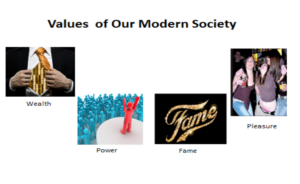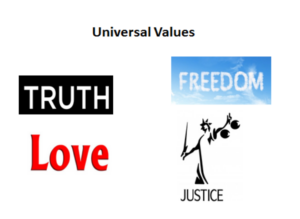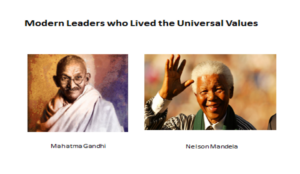Introduction – What are Values?
Values are deeply held principles that:
- guide our decisions & behaviour,
- influence our emotions,
- help define who we are, what we believe & how we live.
Values are held in our heart. That which is dear to us is what we value.
Another word for value is virtue, a natural quality of the human being. Both Socrates and Confucius, among other great teachers have stated that the true way to happiness is to live a life guided by the natural virtues/values. In the holy Indian Vedic text, the Bhagavad Gita, values are spoken of often as guides for life. Chapter 16 begins by listing the Godly qualities of man, beginning with Fearlessness. Among the others listed are Harmlessness, Truth, Serenity, Gentleness, Forgiveness and Fortitude. By living life according to these values, full realisation of human potential is possible.
What are Universal Human Values?
Universal values are those values that are:
- natural to all human beings,
- apply to all people,
- in all places,
- for all times.
When followed, when lived, these values bring balance, peace & happiness to our life. When not followed, the inevitable result is stress, sorrow and unhappiness.
It is therefore useful for each of us to periodically consider what values guide my life.
The Call for Natural Human Values as Guides for Life
The call for finer human values in life is being sounded in many countries; east & west, wealthy & poor, as there is growing concern about the severe tension and stress currently being experienced, especially by young people. What is being increasingly observed is more and more violence, growing social problems and a serious eroding of the family structure. Combining this with a significantly reduced influence of religion in the society, means that the way forward is not clear.
It is important that fine values become an integral part of the educational system as UNESCO’s Commission, headed by Jacques Delors, reports in Learning: The Treasure Within;
“In confronting the many challenges that the future holds in store, humankind sees in education an indispensable asset in its attempt to attain the ideals of peace, freedom and social justice. The Commission does not see education as a miracle cure or a magic formula opening the door to a world in which all ideals will be attained, but as one of the principal means available to foster a deeper and more harmonious form of human development and thereby to reduce poverty, exclusion, ignorance, oppression and war.”
It is useful and necessary to periodically consider what values guide my life.
There are currently strongly held views in both the east and the west that these values will bring us happiness, which is the universal goal of everyone. It is quite interesting to note that in the decadent period at the end of the Roman Empire, these were also the prevalent values. This is documented in one of the most extensively read books of the Middle Ages, The Consolation of Philosophy by Boethius, which is about a wealthy Roman was eventually discovers his mistake in assuming that ‘Wealth, Power, Fame and Pleasure’ would bring him lasting happiness.
What seems to be the focus today is the achievement of quantifiable short term goals i.e. making money, gaining recognition/fame, assuming a positon of authority, obtaining numerous possessions like car(s), house(s),watches, experiencing various pleasures through smoking, drinking , drugs, sex etc, etc, etc. We tend to live in a society where EXCESS is common; we do not seem to know when to stop. The Oxford dictionary has added a new word –‘Affluenza’. This is a disease afflicting affluent people.
There are other values that we might choose to guide our life.
These values are common to all religions and philosophies, although the emphasis may differ. Some traditions are more oriented towards Love and Devotion, while other focus on Truth and Knowledge. Related to Truth are such complementary values as Honesty & Integrity; related to Love are Compassion & Friendship; related to Justice are Fairness & Lawfulness and related to Freedom are Responsibility & Duty.
Another characteristic of our time is a dearth of honourable, unselfish, fearless leaders who live the natural values. Many of our current leaders are in fact actually setting a bad example, thus encouraging others to follow them down the wrong path. We do have some examples in recent history of inspiring, moral leaders.
These men have made a great impression by demonstrating that it is possible to walk the talk, to live the values such as Courage, Perseverance, Integrity, and Patience.
If we are going to find such leaders in the future, then we will need to start early in preparing young people. We will need to inculcate in our young people an appreciation and understanding of the Value of Values. We need to introduce fine values to our young people in schools where they would be an integral part of the education process.
Values Based Education – The Current State of Play
In order to be effective, a values based education programme would need to:
- educate students from an early age on the nature and importance of fine values as guides for life,
- show that values are common to all traditions-spiritual & secular,
- demonstrate the practical application of values in the studies & activities of the school,
- highlight the importance of living the values in developing effective relationships.
The benefits for students of such a programme are:
- Calming the Mind- the presentation of natural human values is useful in settling the confusion and uncertainty that is inevitable when the wrong values are followed e.g. a person lies in order to win/gain personally. The inner tension caused by lying is often covered over so that it is not acknowledged or apparent, but its subtle effect lingers. The same tension is there when we go to excess e.g. eat or drink too much. We can justify it for a time, but when that happens, the excess will continue until it becomes habit and then it is more difficult to arrest. On each step along of the way of excess, the inner stress builds.
- Opening the Heart-The emotional state of young people is very sensitive as it is in its formative stage. It is crucial that the heart is opened to the needs of others. Living such values as Compassion, Generosity, Tolerance and Friendship helps to keeps the heart open which brings peace and contentment. ‘Love thy neighbour as thyself’ was the direction of Jesus.
- Improving their Self-Confidence – We live in a highly competitive environment, which has been intensified by the general access to social media where the status and opinion of others is readily accessible. This continual pressure to succeed, to be better than others, has caused a great deal of doubt and fears for many young people. This continual comparison with others without any reinforcement about their own self-worth, has resulted in a negative attitude and in some cases self-harm. The natural human values aim at showing the true nature of the individual which has been covered over, like the clouds cover the ever-shining sun. By means of a clear presentation about the natural human values and guidance on how to put them into practice, the students can verify for themselves the benefits in choosing the natural values vs the ego driven materialistic values. In doing so they can begin to remove the clouds of ignorance that cover their true nature and empower themselves to move into the creation with greater confidence and enthusiasm.
- Feeding the Soul/Spirit- Human nature has physical, intellectual, emotional and spiritual dimensions. All need to be fed the right kind of food, in the right proportion and at the right time. As noted, the problem in our society today is that the spiritual dimension seems to be neglected in favour of the more material aspects of our being. When the food for these other aspects of our self is out of measure, then in all likelihood the spiritual side will get very little attention. There is agreement in all religions and philosophies about the importance of living the natural human values. As an example all traditions recommend that we: ‘Do to others as we would have them do to us.’ The values material offered comes from all the different spiritual traditions as well as secular sources, so it can also help build a bridge of understanding so that spirituality is seen to be more inclusive. This can replace the ‘I am right and You are Wrong’ mentality which has caused so much pain and suffering down through the ages.
What is the Situation Today in the UK ?
Since 1944 in the UK Education Law has deemed it necessary that schools are responsible to promote the:
- Spiritual,
- Moral,
- Social,
- Cultural,
(SMSC) development of its pupils as an integral part of its academic curricula and activities.
A 2015 report on how schools are implementing this principle was produced by the Royal Society for the Encouragement of Arts, Manufactures and Commerce (RSA), an organisation founded in 1754, to promote fine values in society. The RSA is committed to finding innovative and creative solutions to today’s social challenges. The report entitled, Schools with Soul, found that most schools have moved values and the spiritual dimension to the periphery with the main concentration being on achieving short term quantifiable results e.g. exam grades.The Best Schools report which appeared in the Sunday Times on 5 December 2021 reinforces the point – exam results are the measure.
So instead of using the formative years of young people to help develop inspiring leaders of tomorrow, we are digging ourselves deeper in the cesspit of materialistic values. If this continues, we run the risk that our schools will become Certification Centres instead of providers of fine Education.
Value Based Education Programmes
Over the past210-15 years there has been slow but steady growth in the number of schools in the UK who have introduced more formal programmes on the subject of values. This has been due for the most part to the visionary, charitable activities of a small number of highly motivated organisations. They are usually run by an experienced teacher, Head Master or Head Mistress who has seen first- hand the negative impact of ignoring the spiritual and moral dimensions of education. I have met three of the most influential, effective and inspirational organisations in the field:
- Human Values Foundation ( humanvaluesfoundation.com )
- Value Based Education ( valuesbasededucation.com )
- Living Values Education ( livingvalues.net )
Guidelines for a Values Based Education Programme
Here are some of the common characteristics of the values based education programmes provided by these organisations.
- To be successful they require the firm and active commitment of the Board of Governors, the Heads & the teachers. This does not just mean producing a flowery mission statement about the core values of the school and its ethos; it means giving sufficient time, attention and resources to making the Values programme an integral part of the school’s curriculum.
- The Values programme must consist of inspiring, relevant material which is understood and appreciated by the staff who deliver it, as well as by the students. It also needs to be presented on a regular basis in a way that positively engages the students.
- In order to facilitate student engagement open-ended questions are presented for their consideration. For example, there may be some fine material presented encouraging the young people to not to criticise others. Then a simple question is presented for them to answer- – How can I be less critical of myself and others? The ensuing conversation can bring to light such issues as the pain felt by someone on the receiving end of criticism or the fact that my criticism of myself and others is more common than I imagined.
- To help create the right conditions that would allow meaningful responses from the children, a period of quiet reflection, or silent-sitting as it is called by some, is offered. The students sit quietly, connecting with their inner stillness, and after a short time they are then asked to speak. The positive response received from the students and teachers on this approach confirms the need for fine material about values to be presented and time provided so that they can quietly reflect in order to see more clearly what the value means to them personally.
The Human Values Foundation has introduced a program called The Big Think. Here is a brief description:
Our carefully designed multi-media resources ensure children can engage with values and issues in experiential, creative and analytical ways. Every session begins with a Silent Sitting mindfulness track to focus the mind, followed by a review of The Big Story from the earlier Assembly. Children then take on The Big Question to explore the issue through a Values Inquiry, a Values Dialogue or a Values Role play. To end the session, they reflect in their My Big Think Journal and come together for The Big Sing.
Here is a brief description of the Value Based Education (VbE) approach:
VbE empowers educational settings to underpin their life and curriculum with universal positive human values such as respect, integrity, honesty and compassion.
It is an approach that differs from values education in one particular respect. Values education teaches learners about values. Values-based Education provides a teaching environment in which learners experience those positive universal values first hand throughout their schooling.
An effective VbE environment has three core foundations. All adults model the positive universal values that the school community itself has chosen. The values are developed into an ethical vocabulary which empowers learners and staff to articulate basic and advanced ethical concepts. And the school creates time and space for children to develop reflective practices so their values experiences can be processed into a living guide to self- and interpersonal awareness.
Here is a summary of the key values proposed by Living Values Education:
Peace, Love and Caring Respect, Responsibility, Tolerance, Honesty, Humility, Happiness, Cooperation, Simplicity, Freedom and Unity.
Our relationship to these values and the degree that we live through them determine our life. Awareness of our values brings them to the surface. Through casting greater light on each value, we explore and encourage the positive dynamic of the value to expand within us. We begin to live within a Values Based Atmosphere and this changes – everything.
The benefit then is deep and personal, whether we are child or grown adult, at any age you can determine your future if your values are sound and active in your life. Living Values Education is all about developing Awareness for our values and providing the understanding of how to live in a better world of our own creation.
These successful initiatives demonstrate the awareness of the need for more values based education is increasing and more fine resources are available. This will continue to expand as more schools wake up to the need for a more a holistic education.



